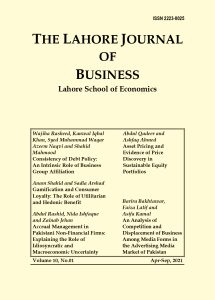Linking Environmental Management Systems to Firm Performance: Empirical Evidence from an Emerging Economy
- Aideed Bashir
- aideed.bashir@ucp.edu.pk
- UCP Business School, University of Central Punjab, Lahore, Pakistan
- Tania Hasan
- taniahasan@gmail.com
- Doctoral Student School of Education and Human Development Texas A&M University, College Station, Texas, USA
- (Corresponding Author)
- Mehwish Jawaad
- mehwish.jawaad02@gmail.com
- Senior Teaching Fellow Lahore School of Economics, Lahore, Pakistan
- Tahreem Nasir
- tahreem.nasir@gmail.com
- PhD Scholar University of the Punjab, Lahore, Pakistan
Submitted
November 22, 2023
Accepted
November 22, 2023
Accepted
November 22, 2023
- Received
- 8 May 2022
- Revised
- 4 February 2023
- Accepted
- 14 May 2023
Abstract
This study aims to determine how environmental performance and customer satisfaction affect the relationship between environmental management systems and company perfor mance. For this purpose,we have collected and analyzed data from 243 textile companies in Pakistan, using partial least squares structural equation modelling. Our empirical results indicate that environmental management systems have a positive and significant impact on business success, customer satisfaction and environmental performance. The findings also show that environmental performance and customr satisfaction mediate the relationship between environmental management systems and business performance in a complementary manner. Our findings show that environmental performance and customer happiness are essential for textile companies to benefit from environmental management systems. The results suggest that Pakistani textile companies should make better use of environmental management systems as valuable tools for addressing stakeholders’ concernsand for boosting financial profits.
Keywords
Environmental management systems
firm performance
customer satisfaction
environmental performance,
PLS-SEM
Pakistan
This work is licensed under LJB.
- Citation
Bashir, A., Jawaad, M., Hasan, T., & Nasir, T. (2024). Linking Environmental Management Systems to Firm Performance: Empirical Evidence from an Emerging Economy. The Lahore Journal of Business, 11(2), 55-88.
- References
- Abbasi, M. (2012). Sustainable practices in Pakistani manufacturing supply chains: Motives, sharing mechanism and performance outcome. Journal of Quality and Technology Management, 8(2), 51–74.
- Abisourour, J., Hachkar, M., Mounir, B., & Farchi, A. (2021). ISO 14001 combined to cost deployment (EMS-CD): A new financial vision. International Journal of Production Research, 59(19), 5771–5789.
- Agan, Y., Kuzey, C., Acar, M. F., & Acikgoz, A. (2016). The relationships between corporate social responsibility, environmental supplier development, and firm performance. Journal of Cleaner Production, 112(3), 1872–1881.
- Ali, A., & Rehman, H. (2015). Macroeconomic instability and its impact on gross domestic product: An empirical analysis of Pakistan. Pakistan Economic and Social Review, 53(2), 285–316.
- Ann, G. E., Zailani, S., & Wahid, N. A. (2006). A study on the impact of environmental management system (EMS) certification toward firms’ performance in Malaysia. Management of Environmental Quality: An International Journal, 17(1), 73–93.
- Asiaei, K., Bontis, N., Barani, O., & Jusoh, R. (2021). Corporate social responsibility and sustainability performance measurement systems: implications for organizational performance. Journal of Management Control, 32(1), 85–126.
- Azorin, J. F., Tari, J. J., Moliner, J. P., Gamero, M. D., & Ortega, E. M. (2015). The effects of quality and environmental management on competitive advantage: A mixed methods study in the hotel industry. Tourism Management, 50, 41–54.
- Banerjee, S. B., Iyer, E. S., & Kashyap, R. K. (2003). Corporate environmentalism: Antecedents and influence of industry type. Journal of Marketing, 67(2), 106–122.
- Boiral, O., & Sala, J. M. (1998). Environmental management: Should industry adopt ISO 14001? Business Horizons, 41(1), 57–64.
- Bozarth, C. C., Warsing, D. P., Flynn, B. B., & Flynn, E. J. (2009). The impact of supply chain complexity on manufacturing plant performance. Journal of Operations Management, 27(1), 78–93.
- Bresciani, S., Rehman, S. U., Alam, G. M., Ashfaq, K., & Usman, M. (2022). Environmental MCS package, perceived environmental uncertainty and green performance: in green dynamic capabilities and investment in environmental management perspectives. Review of International Business and Strategy, 33(1), 105-126.
- Brown, S. (2010). Likert Scale examples for surveys. Iowa State University.
- Camilleri, M. A. (2022). The rationale for ISO 14001 certification: A systematic review and a cost–benefit analysis. Corporate Social Responsibility and Environmental Management, 29(4), 1067-1083.
- Campos, L. M., Heizen, D. A., Verdinelli, M. A., & Miguel, P. A. (2015). Environmental performance indicators: A study on ISO 14001 certified companies. Journal of Cleaner Production, 99, 286–296.
- Çankaya, S. Y., & Sezen, B. (2018). Effects of green supply chain management practices on sustainability. Journal of Manufacturing Technology Management, 30(1), 98–121.
- Castro, G. M., Salvado, J. A., & Lopez, J. E. (2015). Environmental management systems and firm performance: improving firm environmental policy through stakeholder engagement. Corporate Social Responsibility and Environmental Management, 23(4), 243–256.
- Chan, R. Y., He, H., Chan, H. K., & Wang, W. Y. (2012). Environmental orientation and corporate performance: The mediation mechanism of green supply chain management and moderating effect of competitive intensity. Industrial Marketing Management, 41(4), 621–630.
- Chiou, T. Y., Chan, H. K., Lettice, F., & Chung, S. H. (2011). The influence of greening the suppliers and green innovation on environmental transportation research, Part E. Logistics and Transportation Review, 47(6), 822–836.
- Choi, D., & Hwang, T. (2015). The impact of green supply chain management practices on firm performance: The role of collaborative capability. Operations Management Research, 8(4), 69–83.
- Christmann, P., & Taylor, G. (2001). Globalization and the environment: Determinants of firm self-regulation in China. Journal of International Business Studies, 32(3), 439–458.
